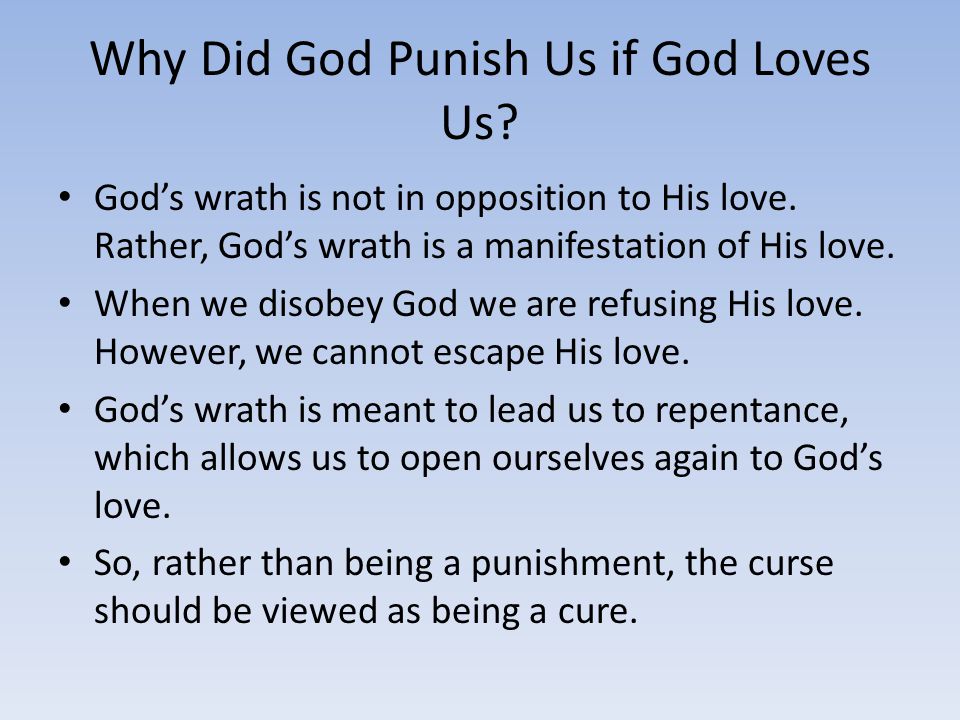How is God’S Wrath a Manifestation of His Love
God’s wrath is a manifestation of His love by serving as a form of correction and discipline for humanity. Through His wrath, God shows His care and desire for us to turn back to Him.
The expression of His wrath is an act of love aimed at guiding us towards a path of righteousness and redemption. In understanding the concept of God’s wrath as a manifestation of His love, it is essential to delve deeper into the intricate relationship between love and discipline.
While the idea of wrath may seem harsh or punitive, it ultimately stems from a place of compassion and concern for our well-being. By exploring this connection, we can gain a profound insight into the multifaceted nature of God’s love and the purpose behind His actions. Through this lens, we can appreciate the significance of His wrath as a transformative force that ultimately leads us back to His unfailing love.
The Nature Of God’s Wrath
God’s wrath is often misunderstood as punishment, yet it stems from His deep love for humanity. It serves as a corrective measure to guide us back to His path, demonstrating His care and desire for our well-being. Through wrath, God shows His unwavering commitment to our spiritual growth and ultimate salvation.
Definition Of God’s Wrath
God’s Wrath is a divine response to sin, reflecting His justice and holiness.
Biblical Examples Of God’s Wrath
1. The Great Flood – God’s wrath poured out due to widespread evil.
2. Sodom and Gomorrah – Destruction as a consequence of sin and disobedience.
God’s Love As The Root Of His Wrath
God’s Love as the Root of His Wrath
Understanding God’s Love
God’s love is the foundation of His character, and it is from this love that all His actions flow. His love is not merely an emotion, but a deep and abiding commitment to the well-being of His creation. In His love, He desires the best for us, seeking to draw us closer to Him and to protect us from harm.
Relationship Between Love And Wrath
God’s wrath is a manifestation of His love in response to sin and evil. It is a reflection of His deep concern for justice and righteousness. When His love is spurned and His people are harmed, His wrath is kindled. It is an expression of His commitment to setting things right and restoring His creation to its intended order.
Purpose Of God’s Wrath
God’s wrath is a manifestation of His love, serving as a means of correction and guidance for humanity. It is a reflection of His desire for us to turn away from destructive paths and embrace His grace and righteousness. Through His wrath, God seeks to lead us back to the path of salvation and eternal life.
Restoration And Discipline
God’s wrath is often associated with punishment and destruction, but it’s important to remember that it also serves a purpose of restoration and discipline. When we sin and turn away from God, we distance ourselves from His love and plan for our lives. In His love, God uses His wrath to draw us back to Him and bring us back into alignment with His will. Through the discipline of His wrath, He teaches us the error of our ways and guides us towards a better path.Protection And Justice
Another purpose of God’s wrath is protection and justice. As a loving father, God has a responsibility to protect His children from harm and defend them against evil. His wrath is a manifestation of this protective instinct, as He acts to remove threats to His people and bring justice to those who seek to harm them. In this way, God’s wrath is an expression of His love for us, as He fights for our well-being and safety. In conclusion, the purpose of God’s wrath is multifaceted and complex. While it may seem harsh and punishing at times, it is ultimately a manifestation of His love for us. Through restoration and discipline, He guides us back to His plan for our lives, while through protection and justice, He defends us against harm and evil. As we seek to understand God’s wrath, let us remember that it is ultimately an expression of His love and care for us.Human Perception Of God’s Wrath
Fear Vs. Understanding
When faced with the concept of God’s wrath, humans often react with fear. However, understanding that God’s wrath is a manifestation of His love can transform this fear into a deeper appreciation for His character.
Transformation Through Wrath
Experiencing God’s wrath can lead to transformation in individuals and communities. By realizing that His discipline is rooted in love, people can grow and evolve spiritually, ultimately leading to a closer relationship with God.
Balancing Wrath And Love
Understanding the concept of God’s wrath as a manifestation of His love is crucial in recognizing the harmony between divine attributes. Balancing wrath and love, particularly in the context of God’s nature, offers profound insights into the depth of His love and the significance of His wrath. Let’s delve into the harmony of divine attributes and the presence of mercy within wrath.
Harmony Of Divine Attributes
God’s wrath and love are not contradictory but rather complement each other, forming a harmonious blend that reflects His perfect nature. The coexistence of these attributes showcases His justice and mercy, emphasizing the importance of understanding both aspects in unison. This harmony provides a balanced perspective on God’s character, ensuring that His love is not undermined by His wrath, and vice versa.
Mercy Within Wrath
Despite the intensity of God’s wrath, His mercy remains an integral part of His nature. His wrath is not devoid of compassion, as it serves as a means of correction and redemption rather than mere punishment. The presence of mercy within His wrath demonstrates His unfailing love, as He desires repentance and restoration for those who have strayed from His path.

Credit: slideplayer.com
God’s Wrath In Modern Context
In the modern context, God’s wrath is seen as a manifestation of His love, guiding individuals towards righteousness and redemption. Through discipline and correction, God’s wrath serves as a compassionate act to steer humanity back on the path of grace and mercy.
Interpretation In Contemporary Society
In modern times, the concept of God’s wrath is often viewed as outdated and irrelevant. Many people struggle to reconcile the idea of a loving God with the notion of punishment and retribution. However, a closer examination of the biblical texts reveals that God’s wrath is not an arbitrary or capricious act of anger, but rather a manifestation of His deep love for humanity.Relevance Of Wrath In A Loving God
God’s wrath is often misunderstood as an expression of divine anger and fury. In reality, His wrath is a righteous response to human sin and rebellion. It is a reflection of His perfect justice and holiness, and a necessary consequence of His love for His creation. In the face of sin, God’s wrath is a call to repentance and a plea for reconciliation.Application In Daily Life
The concept of God’s wrath may seem distant and abstract, but it has real-world implications for our daily lives. Recognizing the reality of sin and its consequences can motivate us to pursue a life of righteousness and obedience. It can also inspire us to extend grace and forgiveness to those who wrong us, as we have received grace and forgiveness from God.Conclusion
In conclusion, God’s wrath is not a contradiction to His love, but rather a manifestation of it. It is a call to repentance and a plea for reconciliation, and a reflection of His perfect justice and holiness. As we seek to understand and apply this concept in our daily lives, may we be motivated by God’s love and grace, and inspired to extend that same love and grace to others.Criticism And Misconceptions
When it comes to the concept of God’s wrath as a manifestation of His love, there are often criticisms and misconceptions that arise. These can stem from misinterpretations and challenges in accepting the idea of wrath as an expression of love. Addressing these criticisms and misconceptions is essential in understanding the depth of God’s love and the purpose of His wrath.
Misinterpretations Of God’s Wrath
One common misinterpretation is viewing God’s wrath as a form of anger or punishment devoid of love. However, God’s wrath is a reflection of His righteous nature and His commitment to justice. It is not driven by mere anger, but rather by His perfect love for humanity. Understanding this distinction is crucial in comprehending the true nature of God’s wrath.
Challenges In Accepting Wrath As Love
Accepting God’s wrath as an expression of His love can pose challenges, especially in a culture that often associates love solely with gentleness and kindness. However, God’s love encompasses both grace and discipline. It is through His wrath that He seeks to correct and guide His people, ultimately demonstrating His unwavering love and desire for their well-being.

Credit: m.facebook.com
Embracing The Paradox
Embracing the Paradox: Understanding how God’s wrath is a manifestation of His love can be a challenging concept to grasp. It may seem contradictory, but delving deeper reveals the intricate connection between love and wrath in the divine nature.
Finding Comfort In Wrath
God’s wrath is an expression of His deep love and care for humanity. It serves as a form of discipline to steer individuals back towards righteousness and away from self-destructive paths.
Resolving The Paradox Of Love And Wrath
God’s love is all-encompassing, including both mercy and justice. His wrath is a reflection of His holiness and the moral order He upholds. By recognizing this duality, one can appreciate the depth of His love even in moments of wrath.

Credit: m.facebook.com
Conclusion
In understanding God’s wrath, we must realize it stems from His love for us. His righteous anger is a manifestation of His desire for us to turn from sin and find redemption. Embracing His love means acknowledging His wrath as a call to restoration and a chance for a renewed relationship with Him.






